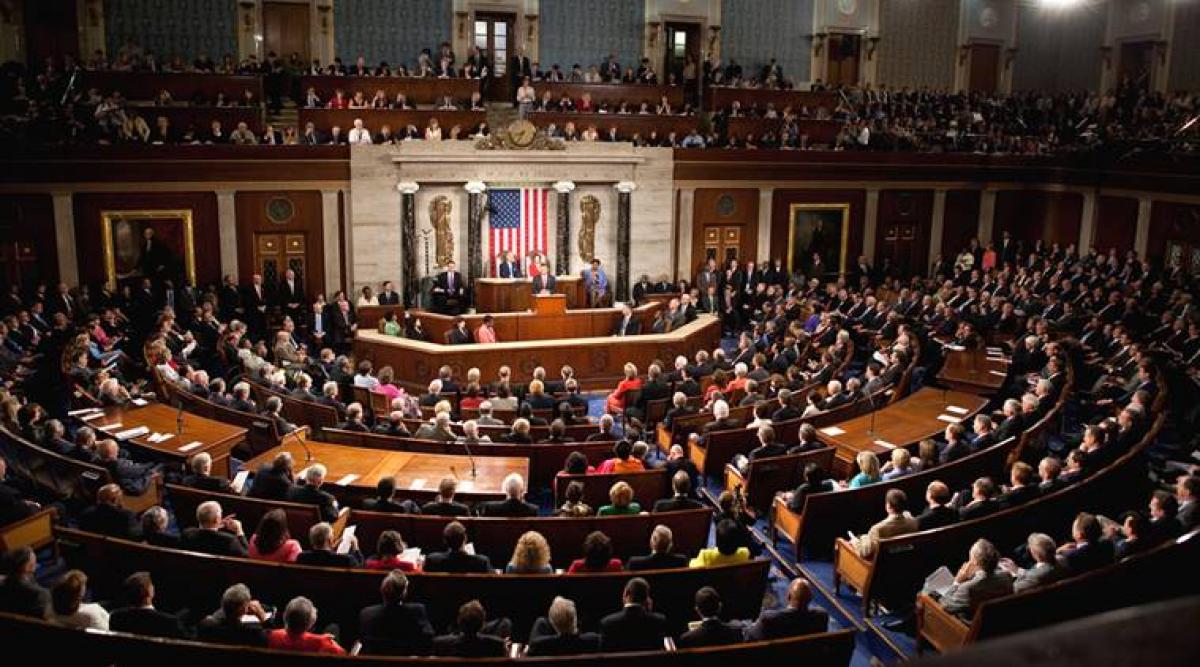Live
- Soros & Gandhis links raise many disturbing questions
- Record additions in non-fossil fuel energy in India
- Indian teens’ grand arrival on world stage
- Chanchalguda Jail Officials Say They Haven't Received Bail Papers Yet, Allu Arjun May Stay in Jail Tonight
- BJP leaders present evidence of illegal voters in Delhi, urge EC for swift action
- Exams will not be cancelled: BPSC chairman
- Nagesh Trophy: Karnataka, T.N win in Group A; Bihar, Rajasthan triumph in Group B
- YS Jagan condemns the arrest of Allu Arjun
- Economic and digital corridors to maritime connectivity, India and Italy building vision for future, says Italian Ambassador
- SMAT 2024: Patidar's heroics guide Madhya Pradesh to final after 13 years
Just In

The US House of Representatives has passed a USD 621.5 billion defence policy bill that proposes to advance defence cooperation with India.
Washington: The US House of Representatives has passed a USD 621.5 billion defence policy bill that proposes to advance defence cooperation with India.
An amendment in this regard, moved by Indian-American Congressman Ami Bera, was adopted by a voice vote by the House as part of the National Defence Authorisation Act (NDAA)-2018, beginning October 1 this year. NDAA-2018 was passed by the House 344-81.
The India-related amendment passed by the House requires the Secretary of Defence, in consultation with the Secretary of State, to develop a strategy for advancing defence cooperation between the United States and India.
“The United States is the world’s oldest democracy and India is the world’s largest democracy. It is vitally important to develop a strategy that advances defence cooperation between our two nations,” Bera said.
“I am grateful this amendment passed and look forward to the Defence Department’s strategy that addresses critical issues like common security challenges, the role of partners and allies, and areas for collaboration in science and technology,” he said.
“Cooperation between the US and India enhances our own defence and our ability to meet the evolving security challenges of the 21st century,” Bera said.
Following the passage of the National Defence Authorisation Act, the Secretary of Defence and Secretary of State have 180 days to develop a strategy for advancing defence cooperation between the United States and India.
NDAA needs to be passed by the Senate before it can be sent to the White House for the US President Donald Trump to sign into law.
As passed by the House, NDAA-2018 asks the State Department and the Pentagon to develop a strategy that addresses common security challenges, the role of American partners and allies in India-US defence relationship, and role of the defence technology and trade initiative.
It also asks them to address how to advance the communications interoperability and security memorandum of agreement and the basic exchange and cooperation agreement for geospatial cooperation.
The previous NDAA-2017 had designated India as a major defence partner which brings India on par with closest American partners in terms of defence trade and technology transfer.
Meanwhile, a senior defence official said India and US defence relationship is on positive track.
“… [As] we look at the global order, and when we look at the evolving security environment within Asia, India’s rise and role [is] evolving, [and] we see the United States and India increasingly viewing the region in the same way, and our interests are very much aligned,” said Cara Abercrombie, Deputy Assistant Secretary of Defence for South and Southeast Asia.
Addressing a New York audience, she said the relationship creates a high level of dialogue in the Pentagon on a range of issues.
“This is all rooted in when we look at the region and [what] we share. We have the same [aerial] security interests, the same counter-proliferation, counter-piracy and counter-terrorism [interests],” she added.
“We have the same interests in upholding this international system that upholds the rule of law that favours freedom of navigation, open sea lanes of communication, and freedom of over flight. Those are values that are critically important to the United States and India to our economic prosperity and to our access in the region,” Abercrombie said during a panel discussion at the 2017 Global Business Forum in New York City.

© 2024 Hyderabad Media House Limited/The Hans India. All rights reserved. Powered by hocalwire.com







